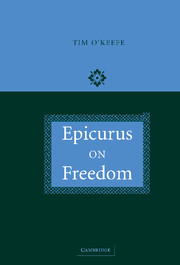Book contents
- Frontmatter
- Contents
- Acknowledgments
- List of abbreviations
- Introduction
- Chapter 1 What sort of an incompatibilist is Epicurus?
- Chapter 2 Lucretius on the swerve and voluntas
- Chapter 3 Aristotle and Epicurus on the origins of character and action
- Chapter 4 Epicurus' reductionist response to Democritean fatalism
- Chapter 5 The swerve and collisions
- Chapter 6 The swerve and fate
- Chapter 7 Epilogue: Epicurus and the invention of libertarian free will
- Appendix: Some texts
- References
- Index
Chapter 7 - Epilogue: Epicurus and the invention of libertarian free will
Published online by Cambridge University Press: 22 September 2009
- Frontmatter
- Contents
- Acknowledgments
- List of abbreviations
- Introduction
- Chapter 1 What sort of an incompatibilist is Epicurus?
- Chapter 2 Lucretius on the swerve and voluntas
- Chapter 3 Aristotle and Epicurus on the origins of character and action
- Chapter 4 Epicurus' reductionist response to Democritean fatalism
- Chapter 5 The swerve and collisions
- Chapter 6 The swerve and fate
- Chapter 7 Epilogue: Epicurus and the invention of libertarian free will
- Appendix: Some texts
- References
- Index
Summary
Most of what Epicurus and Lucretius say about our freedom is compatible with causal determinism. This should not surprise us. Epicurus is not concerned with the freedom required for genuine moral responsibility, but with securing a sort of freedom of action – a rational self‐rule that allows us to control our actions and shape our character, so that we can attain a tranquil life. This type of freedom is compatible with causal determinism. However, Epicurus was led, by a series of philosophical mistakes – understandable mistakes, but mistakes nonetheless – to posit an indeterministic atomic motion to help defuse a threat to our freedom. The swerve plays only the subsidiary role of defusing the fatalist implications of the Master Argument and similar arguments based on the universal applicability of the Principle of Bivalence. Despite the swerve's relative unimportance in Epicurus' own theory of freedom, it is this element of his theory that in the end has had the greatest philosophical impact.
If I am right that it would be anachronistic to saddle Epicurus with a libertarian response to the ‘traditional’ problem of the apparent incompatibility of determinism and the ‘ability to do otherwise’ necessary for genuine moral responsibility, this raises the following questions: how did the ‘traditional’ problem arise, who was the first person to put forward a libertarian response to this problem, and how was this transmitted into the western philosophical tradition? Also, what role did Epicurus' positing of the swerve play?
- Type
- Chapter
- Information
- Epicurus on Freedom , pp. 153 - 162Publisher: Cambridge University PressPrint publication year: 2005



